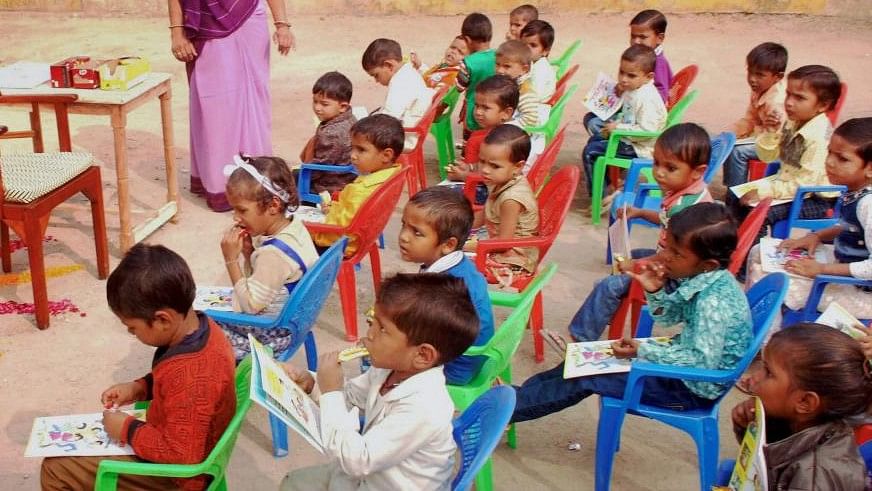
Representative image of children at an anganwadi
Credit: PTI Photo
Bengaluru: Since January, after the Centre implemented a new menu for Integrated Child Development Scheme beneficiaries, Anganwadi workers across the state relate that 75%-90% of broken-wheat upma or khichdi is going to waste. Additionally, the budget for vegetable purchases has not reached workers since late last year — adding to the beneficiaries’ distaste.
“We are throwing out close to 75% of the food we make for children since they find it unpalatable,” says an Anganwadi worker based in Tumakuru. Children start the day with a millet ladoo in the morning followed by a khichdi or upma in the afternoon. An Anganwadi worker from Bellary says that on several days children do not eat up to 90% of the food served.
Approximately 250 grams of the upma is served to a child every day. With over 15 lakh children in 65,911 Anganwadis in the state, an estimated 2.6 lakh kgs of food may be getting wasted per day.
Channe Gowda, a 5-year-old, who visits the Anganwadi in Tumakuru, says, “I do not like the godi upittu. It is served every day. I like carrots and other vegetables. I like chikki,” he says.
“In the past, the spread at the Anganwadi would have some variety and more suited to local tastes. Instead of fixing nutritional gaps in such food, the government has changed it to food that is alien to the children. We are not sure of the quality of this food either,” she adds. In the past, milk would be provided along with breakfast. Rice and saaru that had vegetables would be served in the afternoon. In the evening, children would be provided with peanuts and chikki.
The vegetables served as an important source of vitamins and minerals and would add variety to the food. “It just made food easier to understand and digest for children. Many children have also complained that their stomach is upset because of the new food,” says an Anganwadi worker from Ballari.
An Anganwadi worker in Kalaburagi explains that the powder provided to make the millet ladoo is of poor quality and a fourth of the quantity provided is unusable due to its texture. The broken wheat provided in lieu of rice, dal and vegetables has a ‘masala packet’, which the government assures has the necessary nutrients to keep children in good health.
“How can we provide boiled wheat with masala, without oil or vegetables, and expect children to eat it? They have to be provided with nutritional local food. In the absence of that, children are not going to eat it,” says the worker from Kalaburagi. She adds that most workers in her district have approached the administration but have been turned away.
“The menu configurations are approved by the Defence Food Research Laboratory. We have cancelled the khichdi after Anganwadi workers took objection to it. They do not want it in a pre-mix format. Sanction for rice, dal and other supplies has come in from the Central government. We will revert to the previous format by April 15,” says B H Nischal, Joint Director(ICDS).